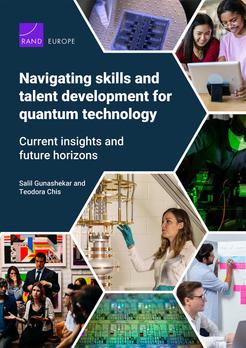What is the issue?
Quantum technologies have experienced substantial advancements in recent years, showcasing their potential across multiple sectors, including the life sciences, finance, aerospace, defence, energy and telecommunications. This swift progression emphasises the necessity for a skilled workforce that can drive innovation and translate theoretical advancements into practical applications. This need has been recognised by academia, industry and government alike, making the development of a robust talent pipeline an important priority. However, the quantum technology ecosystem is experiencing a skills gap, with current talent pools falling short of meeting the expanding requirements of this emerging field.
How did we help?
RAND Europe and the Novo Nordisk Foundation convened a roundtable in Copenhagen to explore critical components of the quantum technology ecosystem, with a focus on skills and talent development. Discussions also covered supply chain resilience, the findings of which will be presented in a forthcoming report. The roundtable was the second in a series of quantum technology thought leadership events that brought together a range of researchers, industry experts, decision makers and policymakers. Discussions at the roundtable centred on examining key emerging trends, challenges and opportunities, as well as strategies to address the skills gap in quantum technology and nurture a robust talent pipeline. This report captures the perspectives and insights of participants at the roundtable, serving as a concise guide to inform and contribute to the broader stakeholder discourse on quantum technology skills and talent, as policy on these key issues develops.
What did we find?
The discussion encompassed the following trends and insights related to the development of skills and talent in quantum technology.
- The global quantum technology ecosystem is evolving to become increasingly heterogeneous, encompassing a range of expertise and disciplines.
- There are key challenges concerning the availability, types and distribution of skills pertinent to advancing the quantum technology ecosystem.
- Universities worldwide are expanding quantum-related degree programmes and research opportunities, while industry players are also increasingly developing educational content and tools, collectively enhancing quantum literacy and workforce readiness.
- The development of a robust, sustainable quantum technology talent pipeline will require adopting a patient, long-term approach that targets different learning levels across the education and skills development journey.
- Addressing the quantum technology workforce development challenge necessitates coordination, community building and common standards.
What can be done?
Based on the roundtable discussions, we propose eight cross-cutting policy considerations and associated enabling actions for stakeholders looking to support development of the quantum technology skills ecosystem. Collectively, these considerations aim to build a more resilient, equitable and future-ready quantum technology skills pipeline. We believe that these principles could underpin a future ‘Quantum Technology Skills Charter’, articulating a collective statement of intent, ambition and commitment among stakeholders including public, private and third sector (including civil society) entities. This charter could facilitate focused, coordinated efforts and actions to proactively address the key challenges related to quantum technology skills and the broader workforce.







